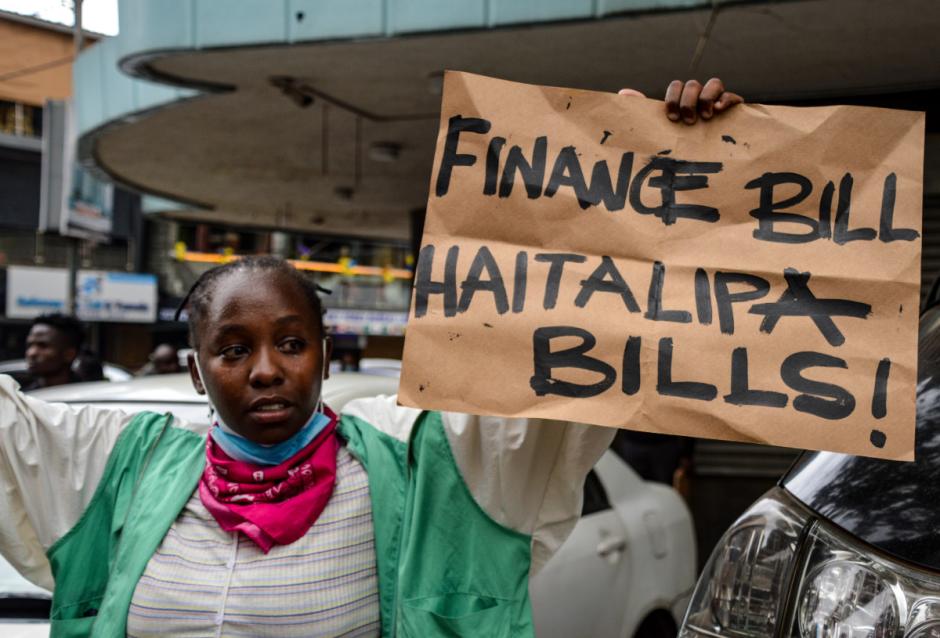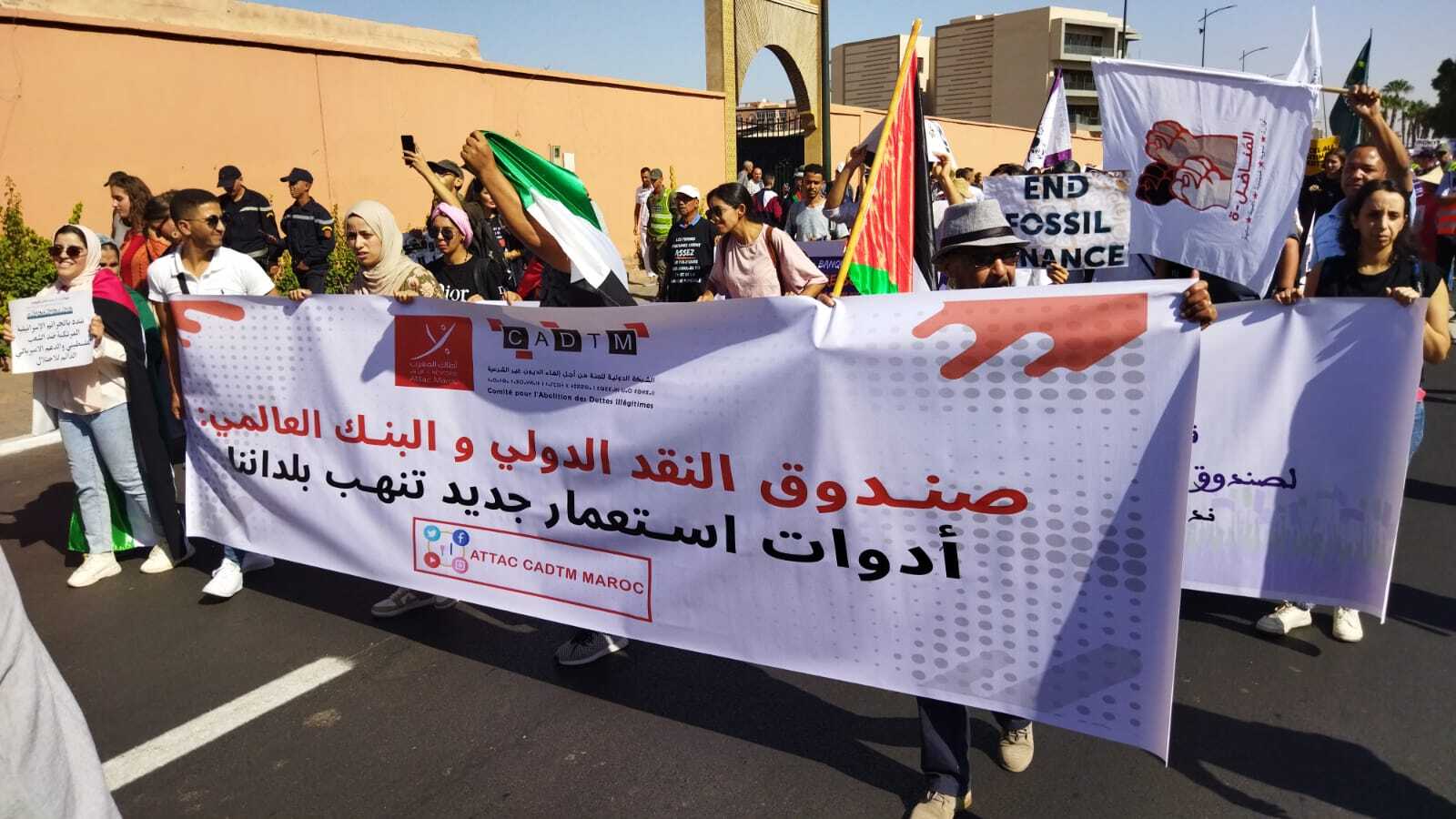July 1, 2024
Re: Stop imposing harmful conditionalities, austerity measures and neoliberal policies that negatively impact impoverished countries
Dear IMF Board of Directors,
We are deeply concerned about the deadly protests in Kenya triggered by the introduction of regressive taxes and unjust structural reforms through the Finance Bill 2024. These policies are the result of the IMF imposing conditionalities on loans that continue to reshape economic policies and laws in Kenya and other countries in the Global South and that have disproportionately affected already impoverished and marginalized communities. As a global network comprising of about 300 members and allies including social movements, indigenous Peoples’ groups, NGOs, academic institutions, trade unions and advocates across more than 80 countries, who are committed to making human rights and social justice a reality for all, ESCR-Net – International Network for Economic, Social and Cultural Rights calls for an end to policies and conditionalities that deepen impoverishment, inequality and dispossession of communities in Kenya and elsewhere, often intensifying illegitimate and unsustainable debt burdens.
Despite ongoing calls and demands to confront these problematic policies, the IMF has relentlessly imposed neoliberal policies that force countries to prioritize debt repayment over human rights through a combination of regressive taxation, privatization, deregulation and cuts on public spending that undermine essential services guaranteed under international and national laws.
Human rights and people’s well-being should be at the heart of any debt restructuring decisions. However, the narrow private interests of corporate and financial actors often seem to influence IMF’s packages resulting in harsh conditionalities on loans. Countries are forced to prioritize debt repayment or risk debt default that could invalidate the country’s credit worthiness and impact on its ability to access international financial markets.
Kenya’s situation analysis
Kenya is one of the countries in the Global South with higher risk of debt distress as per the Debt Sustainability Analysis (DSA) report by International Monetary Fund (IMF) as of June 2023, when public and publicly guaranteed debt in nominal terms was 70.8 percent of GDP. According to the Kenyan National Treasury, as of January 2024, the present value of public debt was 68.2 percent of GDP against the approved debt anchor of 55 percent of debt to GDP set by the IMF. The domestic debt was 36.5 percent while external debt was 31.7 percent of GDP. As at end June 2023, 58.8 percent of total revenue was being dedicated to debt service payments. The government has continued to borrow from the IMF amid the slow global efforts to address corporate tax evasion. Kenya and other governments are forced to contemplate increased forms of taxation with disproportionate impacts on the impoverished.
In April 2021, Kenya signed a three-year $2.34 billion loan with the IMF. The loan enabled Kenya to draw on its Special Drawing Rights (SDRs) but under harsh conditions, namely the implementation of a regressive tax policy and the scrapping of subsidies including on fuel and electricity, to fully bridge its fiscal gap. In 2023, Kenya received additional $684.7 million to pay for its Eurobond that was maturing in June. In 2024, IMF staff and the Kenyan authorities reached staff-level agreement on economic policies to conclude the fourthreview of the 38-month EFF/ECF arrangements paving the way for access to $1 billion. The IMF statement on 11 June 2024, after reaching staff-level agreements on three of its loan facilities with Kenya, said: “A sizable and upfront fiscal adjustment in FY 2024/25 will be needed to correct the course, to this end, the authorities have taken decisive steps towards fiscal consolidation by introducing several measures in the context of the draft 2024/25 Budget and the 2024 Finance Bill. Importantly, the latter centers on measures to broaden the domestic tax base…public expenditure and wage bill reforms, state-owned enterprise restructuring, rationalizing unproductive current spending, and better targeting of subsidies and transfers…”
This explains the unprecedented introduction of more taxes and rising costs of fuel and electricity that impact on ordinary Kenyans, even as this borrowing has been spent primarily on debt repayment rather than much-needed investments on public services including health care, social security and education. In response to the introduction of additional taxes on the poor and the scrapping of subsidies on essential goods, against a backdrop of continuous under-investment in public services, several massive protests erupted in Nairobi in the past few weeks involving thousands of Kenyans led by young people who rightfully refuse to see their rights and futures being denied.
The fiscal social contract is based on the principle of mutual responsibility and reciprocity. While Kenyan citizens agree to pay taxes, the government has an obligation to provide essential services guaranteed under international and domestic laws, such as education, healthcare, housing, infrastructure, security, and social security. The IMF’s harsh conditionalities, which have been tried and tested before with disastrous results, influenced the drafting of the controversial Finance Bill that has caused outrage in the country.
While the IMF talks about monitoring the situation and desiring inclusive growth, it is unclear if the IMF is listening to the majority of Kenyans or simply waiting for a new proposal of austerity measures to ensure debt repayment.
Debt transparency and accountability
The prioritization of debt service payments to creditors at the expenses of human rights and people’s well being has sparked anger among Kenyans. As a further concern, decisions around contracts and agreements take place without transparency and accountability. Kenyans struggle to understand how their governments entered into borrowing and lending arrangements with lenders including the IMF, how the money is utilized at the country level, and the conditions within contracts and agreements. Lack of transparency among private actors, IFIs, and lending governments undermines democratic participation and accountability and paves the way to undue corporate influence.
The current debt crisis is not unique to Kenya. Other countries in Africa considered to be in debt distress and at high risk of such distress include Zambia, Congo, Mozambique and Zimbabwe, Burundi, Cameroon, Chad, Gambia, Guinea, Ghana, South Sudan, and Togo, who will face or are facing similar conditionalities that threaten the human rights and well-being of their people.
In addressing the pressing economic, social and political issues related to debt, we call on the IMF to:
- Cancel unsustainable debts and surcharges, particularly of low- and middle-income countries struggling with unsustainable and often illegitimate debt burdens.
- Stop imposing harmful conditionalities; the IMF and other international creditors should refrain from imposing austerity measures and neoliberal policies that negatively impact impoverished countries. These include the devaluation of currencies and structural adjustments like increases in regressive taxes, reductions in public spending, and weakened labor protections.
- Democratize the debt process by ensuring transparency, accountability, and democratic governance, including meaningful participation of impacted communities, citizens and CSOs at all decision-making levels, particularly in the design of policies that impact on cost of living, access to livelihood, and essential public services.
- Ensure all financing, safeguards, and guidance provided to countries give primacy to human rights obligations and environmental protections and promote a just and equitable transition towards an economy that centers care for people and the planet. This includes gender responsive human rights impact assessments of fiscal policy reform on gender and economic inequality and a rejection of those with negative social impacts.
- Stop the corporate capture of government and intergovernmental institutions and decision-making to guarantee human rights, and actively support regulation of corporate and financial actors to ensure their respect for human rights in home and host States.
- Implement counter-cyclical economic policies that go beyond the sole purpose of debt reduction and fiscal consolidation, and instead focus on redistribution and establishing a fundamental social protection system.
- Put in place mechanisms to work with civil society stakeholders, particularly in contexts where conflict and repressive governments have directly attacked and/or undermined community resources to safeguard livelihood security and public health.
- Closely monitor private sector and public projects to ensure respect for human rights, labor and environmental standards, and make clear that retaliation or discrimination for freedom of assembly, association, or political views will not be tolerated.
Endorsing members:
- MenaFem Movement for Economic, Development And Ecological Justice – MENA
- National Fisheries Solidarity Movement- South Asia
- Kisora -Kenya
- Al-Haq- SWANA
- Sanam Amin- Individual member- Asia Pacific
- International Women’s Rights Action Watch Asia Pacific (IWRAW AP)- Malaysia-South East Asia
- ALTSEAN-Burma- Asia
- Zimbabwe Peoples Land Rights Movement- Sub Saharan Africa
- Viluthu – South Asia
- Why Me Women’s Rights – Libya
- Pamoja Trust- Kenya
- BRICS Feminist Watch, Global
- PWESCR, India
- Saeed Baloch Pakistan Fisherfolk Forum
- Peace Track Initiative
- Southern and Eastern Africa Trade Information and Negotiations Institute (SEATINI) Uganda
- Socra -Argentina
- Pueblo Originario Kichwa de Sarayaku-Ecuador América del Sur
- National Union Of Domestic Employees- CARIBBEAN
- Nairobi Peoples Settlement Network (NPSN) – Kenya
- Project on Organizing, Development, Education, and Research (PODER)- Latin America
- Economic and Social Rights Centre (Hakijamii) – Kenya
- Institute for Justice and Democracy in Haiti -Haiti/USA
- National Fisheries Solidarity Organization (NAFSO)- Sri Lanka
- Confederación Campesina del Perú -Peru
- Center for Economic and Social Rights (CESR)- Global
- Good Health Community Programmes- Kenya
- Right to Education Initiative- Global
- Phenix Center- Jordan
- Kenya Human Rights Commission- Kenya
- CADTM- Europe
- Justiça Global – Brasil
- Mumbo International- Kenya
- Collaboration of Women In Development – Kenya
- Initiative for Social and Economic Rights (ISER)- Uganda
- Mombasa County Health Network MCHANE- Kenya
- Global Initiative for Economic, Social and Cultural Rights (GI-ESCR)- Global
- erlassjahr.de (Jubilee Germany) – Germany
- Raise The Young Foundation – Gambia
- Human Rights Awareness Center – Asia
- Muungano Wa Wanavijiji – Kenya
- Peoples Health Movement – Kenya


